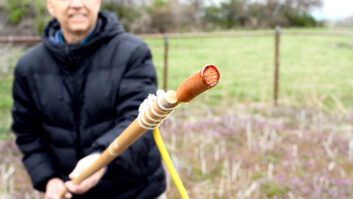(click thumbnail)There was a time when I had the pleasure of reading over the contest rules for a group of stations. No, I’m not a lawyer, but I played one in radio for awhile.
This thankless aspect of the job brought me grief, eye fatigue and, on that odd occasion, outright laughter. The thread I picked up is that most program and marketing directors believe that if they word contest rules or releases properly, they can get away with nearly anything, whether or not it’s permissible, morally acceptable or even legal.
We should be relieved as an industry that the FCC is understaffed and that, for the most part, our listeners believe what we tell them. If this weren’t the case, you’d be seeing a lot more fines for improper contesting and a variety of lawsuits from individuals.
Allow me to present a small overview to help you keep your ears and eyes open for issues at your stations.
First of all, forget everything you’ve heard about release forms — especially forms written allegedly to protect your station against claims. There is no such thing as an air-tight release form.
Just because one of your listeners signs a release acknowledging risk of injury in one of your stunt contests, don’t imagine for a minute that you’re protected. Fortunately for you, listeners signing the release may really believe that they’ve signed their rights away, never even thinking to call a lawyer to come after you if they’ve been injured.
A release doesn’t prevent anyone from suing you, nor does it protect you when you knowingly place a listener in a dangerous situation.
Rules that do not properly disclose material terms of a contest are problematic. You must inform contestants regarding the following:

- The prize and its value;
- How and when listeners may enter to win and if there are alternate means of entry;
- What happens in case of tie, or whether you must select another winner if the original winning candidate fails to meet qualifications;
- Odds of winning;
- Restrictions and limitations — such as age restrictions or residency requirements (very important with many stations streaming on the Web);
- How a winner obtains the prize and during what period he must make the claim; and
- What happens to the prize if the winner doesn’t make a claim.
How many of these material terms you actually broadcast is your company’s decision, as the FCC is clear neither about the required level of detail nor how often the terms must be broadcast.
Many companies will broadcast 30-second rules once a daypart for one week, then once a day in rotating dayparts for the remainder of the contest.
Very funny, ha ha
Flippant remarks about contests on-air can be trouble.
Remember the story in 2005 about the evening DJ who told his listeners he was giving away “a hundred grand” and it turned out to be a Nestle’s 100 Grand candy bar? The winner didn’t find it amusing. Nor did the contestant in 2002 who won a “Toy Yoda” instead of Toyota. Legal action ensued in this case.
Contesting on station Web sites can also be tricky.
Make sure you disclose how you’re using collected data. No, you can’t just take the entries and give them to a third party, like the client sponsoring the contest. Your site should have a privacy policy that is visible to the public and followed closely by your staff.
Is your head in the sand about rights issues for your site? You’re not alone. A quick glance at radio station Web sites in several major markets shows frequent copyright violation.
You may not “borrow” pictures and post them in your toolset. Ascribing attribution — informing the public of the origin of the pictures — will not protect you.
For example, I just finished viewing a gallery of photos from Sports Illustrated on a radio station Web site. The station informed us all of the photos’ origin, but I seriously doubt that a license was obtained. Why? Because there were more photo galleries from other magazines and Web sites — some with attribution, some with none.
An actual license for use of photos can be expensive; few stations are allocating thousands of dollars per month for licensed photos.
Although I’ve played a lawyer on radio, I am no substitute for real legal counsel. Play it safe and call those men and women in the suits. Whether it’s a copyright issue or a bungee-jumping listener, you want a legal eagle on your side.












